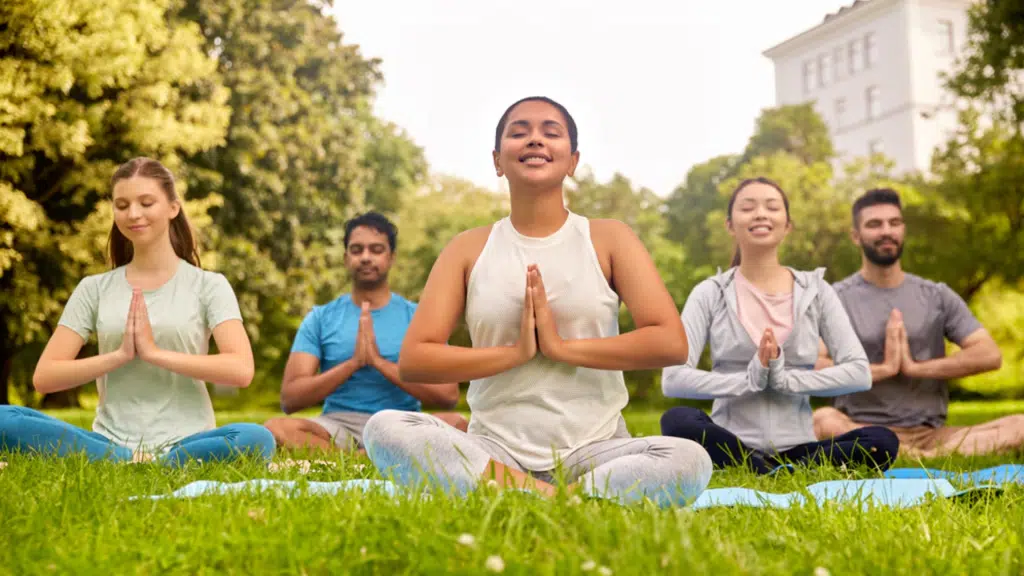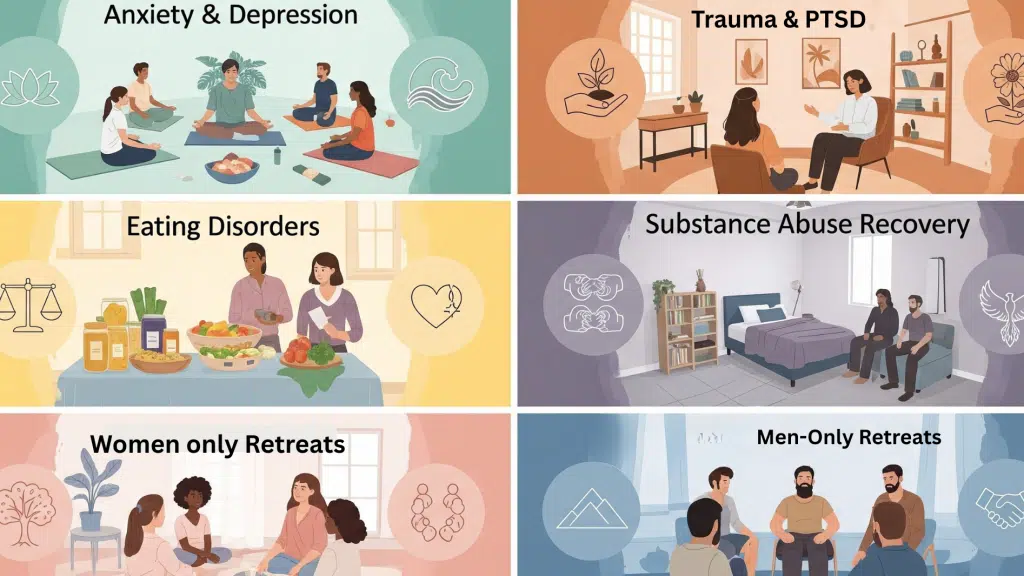If life’s starting to feel like too much and you’re dealing with stress, anxiety, or emotional pain, I want you to know you’re not the only one. I’ve been there too.
Sometimes, a simple break isn’t enough. What you really need is a full reset. That’s where a mental health wellness retreat can truly help.
I’ll walk you through what these retreats are all about, what actually happens during them, and how they can support real healing.
From therapy and mindfulness to nature time and quiet space, you’ll get a clear picture of what to expect and how to find a retreat that fits you. Let’s see how a retreat might help you reconnect with yourself.
Understanding Mental Health Wellness Retreats
Mental health retreats are programs where you take a break from daily life to focus on your well-being. They help people work through issues like anxiety, depression, stress, and trauma.
These retreats take place in calm, peaceful locations where you can relax, reflect, and heal.
Through different healing activities like therapy, yoga, and mindfulness, you can reset your mental health, gain clarity, and learn ways to handle life’s ups and downs with more ease.
How Mental Health Retreats Support Healing

Mental health retreats offer more than just rest; they provide structured support to help you heal emotionally, mentally, and physically. Here’s how they work:
Types of Therapy You’ll Experience
Most retreats include a mix of therapy, like:
- Yoga and meditation
- Group and one-on-one sessions
- Mindfulness practices
- Nutrition support
Together, these help you find balance, feel stronger emotionally, and clear your mind.
Yoga and Meditation
Yoga and meditation are powerful tools for healing your mind and body. Yoga helps release built-up tension, improves flexibility, and boosts physical and mental energy.
Meditation teaches you to slow down, stay present, and manage stress more effectively. Together, they create a calming routine that supports emotional balance, self-awareness, and inner peace, making them key parts of many mental health retreat programs.
Group and One-on-One Therapy
Group therapy lets you connect with others who are going through similar things. Sharing your story in a safe space can help you feel supported and understood.
One-on-one sessions give you private time with a therapist to talk about personal challenges and set healing goals.
Mindfulness and Nutrition
Mindfulness helps you stay in the moment. At retreats, this might include deep breathing, guided meditation, or gentle movement.
You’ll also learn how to eat in a way that supports your mental health. Good nutrition can boost your energy and mood, and help your brain work better.
Healing Through Innovative and Holistic Activities
Many retreats offer extra healing tools like:
- Art therapy: to express emotions in a creative way
- Spa treatments: to help your body relax
- Nature walks: to connect with the outdoors and feel grounded
These activities make the retreat experience more peaceful and healing.
Types of Mental Health Retreats by Condition

Not all mental health retreats are the same. Some are designed for specific struggles like trauma, anxiety, or recovery. Here are a few types to consider based on your needs:
1. Anxiety and Depression Retreats
These programs help you manage stress, anxiety, and depression. You’ll learn tools like breathing exercises, meditation, and therapy to feel more in control and calm.
They often include both group and individual therapy, along with yoga and mindfulness.
2. Trauma and PTSD Retreats
If you’ve experienced trauma, these retreats provide safe support. Therapies like EMDR (Eye Movement Desensitisation and Reprocessing) are often used to help process painful memories.
You’ll also get group support and holistic care to help you feel stronger and more stable.
3. Eating Disorder Retreats
These retreats combine therapy and nutrition counselling. They focus on building a healthy relationship with food and improving self-esteem.
Programs often include mindful eating, body-positive therapy, and support from trained professionals.
4. Substance Abuse Retreats
Recovery retreats support people who want to stop using alcohol or drugs. You’ll get help from therapists, join group counselling, and learn healthy ways to cope with triggers.
These retreats often include detox support and long-term recovery plans.
5. Gender-Specific Retreats
Some retreats are for women only or men only. These programs offer a safe space to open up and work through personal struggles without outside pressure.
They focus on personal growth, emotional healing, and topics unique to each group.
Top Mental Health Retreats in the U.S.A.
The U.S. is home to several trusted mental health retreats that combine therapy, nature, and holistic care. Each one offers a unique path to healing and personal growth. Here are some to consider:
1. Esalen Institute
Esalen Institute is a coastal retreat that blends psychotherapy, somatic practices, and mindfulness. With ocean views and natural hot springs, it creates a serene space for deep healing and reflection.
You’ll find workshops on emotional resilience, bodywork, and spiritual exploration led by skilled facilitators.
Location: Big Sur, California
Retreat Focus Areas: Mindfulness, Stress Relief, Body-Based Healing
2. Omega Institute for Holistic Studies
Omega Institute offers mental health and emotional wellness programs rooted in holistic traditions. You’ll engage in yoga, meditation, and expressive arts to promote healing and clarity.
Its community-centred environment supports meaningful transformation in both group and individual settings.
Location: Rhinebeck, New York
Retreat Focus Areas: Emotional Recovery, Mindfulness, Creative Healing
3. The Beachcomber Recovery Centre
This Florida-based retreat specializes in trauma and addiction recovery through evidence-based therapies. With oceanfront access and a calm setting, it fosters emotional healing in a luxurious atmosphere.
You’ll experience personalised support in a small, private group setting.
Location: Delray Beach, Florida
Retreat Focus Areas: Trauma Recovery, Substance Abuse, Individual Therapy
4. Cross Creek Ranch
Cross Creek Ranch is a secluded wellness retreat that blends nature immersion with trauma-informed care. It offers private therapy, equine therapy, and holistic treatments in a peaceful Texas setting.
The ranch promotes long-term recovery through structured programs and natural healing.
Location: Texas Hill Country, Texas
Retreat Focus Areas: Trauma Recovery, Holistic Wellness, Nature Therapy
5. Shambhala Mountain Centre
Shambhala combines ancient wisdom with modern practices to support emotional clarity. Nestled in the Colorado Rockies, it provides meditation, yoga, and contemplative workshops for deep inner work.
Ideal for those seeking a spiritual reset and emotional renewal in a tranquil mountain setting.
Location: Red Feather Lakes, Colorado
Retreat Focus Areas: Spiritual Healing, Meditation, Self-Discovery
Benefits of Attending a Mental Health Retreat
Going to a mental health retreat can bring real change. It helps with healing, personal growth, and feeling better in the long run. Here are the main benefits:
Whole-Person Healing: Retreats focus on helping your mind, body, and emotions. You’ll do things like yoga, meditation, and mindfulness to deal with stress, anxiety, and past pain. These activities help calm your mind and support deep healing.
Time to Reflect and Grow: You’ll be in a quiet, peaceful place, away from daily stress. This gives you time to slow down, think clearly, and focus on yourself. Many people leave with a better sense of who they are and how to handle their emotions.
Long-Lasting Results: The tools and lessons you learn can stay with you for a long time. You may find it easier to manage stress, understand your feelings, and stay calm in tough times.
These changes help you feel stronger and more in control even after the retreat ends.
Choosing the Right Mental Health Retreat
Not every retreat is the same, and what works for one person may not work for another. Here’s how to find a retreat that truly supports your healing:
Considerations Before Choosing a Retreat
When selecting a mental health retreat, consider factors such as your specific needs (e.g., trauma recovery or anxiety management), the types of treatments offered (e.g., yoga, therapy), and your budget.
Research the length of stay, services provided, and whether the retreat’s environment matches your healing goals. Finding a retreat that aligns with your personal and financial goals ensures a meaningful experience.
Key Qualities of a Good Mental Health Retreat
Key factors to evaluate include the therapist-to-client ratio, which ensures personalised care, and the types of therapies available, such as individual and group therapy, mindfulness, or holistic treatments.
Success rates, testimonials, and accreditation are also important considerations, as they reflect the retreat’s effectiveness in achieving long-term mental health improvements. Ensure the retreat’s approach aligns with your healing approach.
Questions to Ask Before Booking
Before booking, ask essential questions like:
- What is the retreat schedule?
- What types of therapy are offered, and how flexible are the programs?
- What are the therapist’s qualifications, and what experience do they have with specific mental health issues?
Inquire about the retreat’s success rates and whether it aligns with your specific needs, such as anxiety management or trauma recovery.
How Much Does a Mental Health Retreat Cost?
Wondering how much a mental health wellness retreat costs? Here’s a breakdown of what affects pricing and what you can expect for your budget:
Pricing for Different Types of Retreats
The cost of mental health retreats varies based on duration and services offered.
Short-term retreats, such as weekend getaways, can range from $500 to $2,000, while long-term stays of 30 days or more may cost between $5,000 and $15,000.
Specialised retreats focusing on specific conditions like PTSD or addiction recovery tend to be more expensive due to the intensive care and therapy involved.
Factors Influencing Price
Several factors influence the overall cost of a retreat. The length of stay is a primary consideration, with longer retreats generally costing more.
Location also plays a role, as retreats in remote or luxury settings tend to have higher prices.
Additionally, the type of therapies offered, such as specialised treatments, individual therapy, or holistic services, can increase costs due to their personalised nature.
Discounts, Packages, and Insurance
Many mental health retreats offer discounts for early bookings or extended stays.
Group rates are often available for multiple participants, and some retreats provide packages that bundle services like therapy, yoga, and spa treatments at a reduced rate.
It’s also worth checking if the retreat accepts insurance, as some programs may be covered by health insurance or offer financing options to help with costs.
Preparing for a Mental Health Wellness Retreat
Before your retreat, set a few personal goals. Decide what you want to work on: stress, trauma, or something else. Try to get some rest beforehand, and check the schedule so you know what to expect.
Pack comfortable clothes, basic toiletries, any medications you take, and a journal or book for quiet time. Bring anything that helps you relax, like music or a cozy sweater. Most importantly, come with an open mind.
Your retreat days may include group therapy, one-on-one sessions, yoga, meditation, and time in nature. Some moments may be tough, but trained staff will guide and support you throughout.
Conclusion
Now you’ve seen how a mental health wellness retreat can offer real support when life feels heavy.
If you’re facing anxiety, working through trauma, or just burnt out, these retreats give you the space to breathe, the tools to grow, and a way to start feeling like yourself again.
Take a moment to think about what you need most right now. Even one small step forward can lead to a big change. I’ve seen it happen.
If this helped you, there’s plenty more to learn. Check out my other blogs for real talk, simple mental health tips, and support to help you feel stronger every day. Your path to healing starts here.









